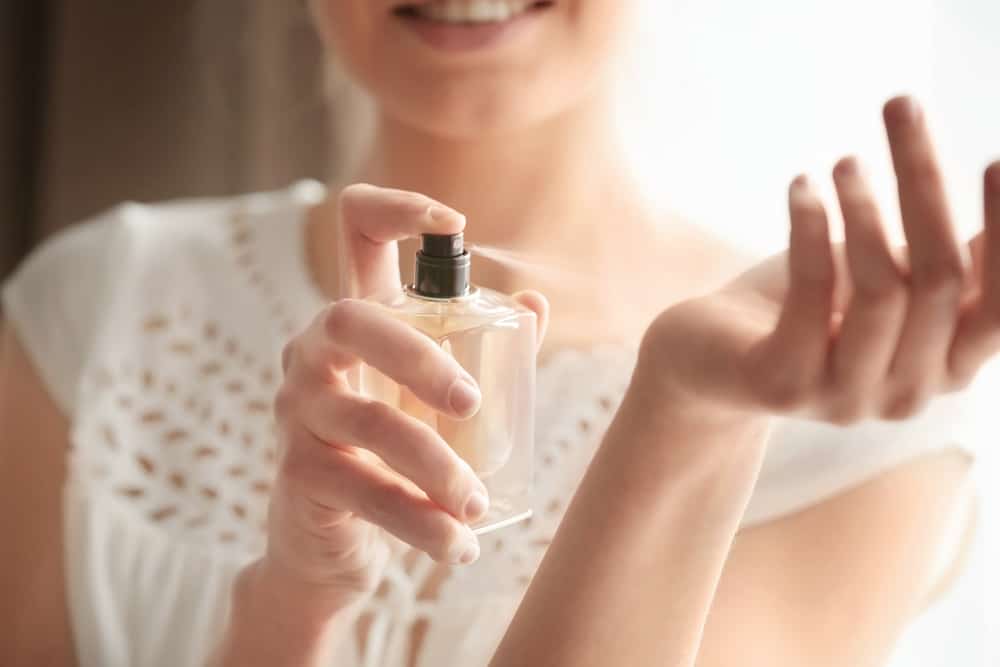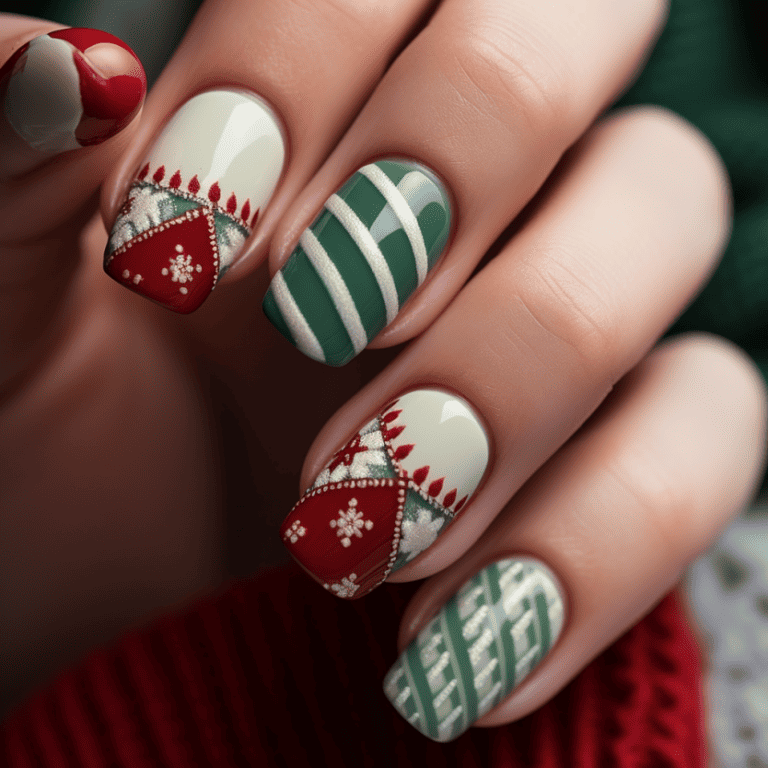How Long Does Perfume Last On Clothes? (Explained)

Perfume has long been used to attract others, identify individuals, and mask odors.
However, some wearers only want the smell to last for a few hours while others would prefer longer.
People also apply perfume in many different ways and to different clothing articles, body parts, and anything else they want to smell good.
Some people are greatly affected by scents, though, and must consider the longevity of the perfume before applying.
Whether you’re allergic to scents or just sensitive to smells, it’s good to know how long odors will stick around.
How Long Does Perfume Last on Clothes?

Perfumes can last anywhere from a few hours or up to a week on clothes.
The length of time perfume will stay on your clothes is dependent on the quality of the perfume and also the material of the clothing.
How it was applied and the amount of application can also be factors in the longevity of the scent.
With so many variables in play, it can be difficult to narrow down the timeline of the perfume.
What Is in Perfume?

Perfume consists of fragrance oil diluted in alcohol and water, solvents, and fixatives.
The aromatic oil used in perfumes is made from either natural herbal materials or synthetic.
Common ingredients in perfumes include benzyl alcohol, acetone, linalool, ethanol, ethyl acetate, benzaldehyde, camphor, formaldehyde, methylene chloride, and limonene.
Natural aromas are created by using essential oils, while synthetic chemicals used to create scent include coumarin, á-amyl cinnamaldehyde, benzyl benzoate, p-anisaldehyde, and benzyl acetate.
More companies are leaning towards the use of essential oils recently as the demand for more natural products has risen among consumers.
Many of these synthetic chemicals are also found in body lotions, shampoos, conditioners, soaps, and body washes.
What Are the Most Common Forms of Fragrances?

There are basically four forms of fragrances: Eau de Fraiche, Perfume, Cologne, and Eau de Toilette.
All four of these common fragrances are pretty much the same, except for their oil concentration levels.
This means some of them last longer than others.
Eau de Fraiche is the most diluted of these four types of fragrances, containing only 1% to 3% oil.
This makes for a short-lasting smell, usually less than an hour when applied to the skin.
Cologne contains 2% to 4% oil, which will last about two hours on the skin.
Usually light in composition, eau de toilette contains 5% to 15% fragrance oil, making it last about three hours on the skin.
There are actually two types of perfume.
One is simply called perfume and the other is usually listed under the name eau de parfum, which is about 15% to 20% fragrance oil and when applied to the skin, can last anywhere from five to eight hours.
Perfume is the strongest and most concentrated variety of fragrances, containing 20% to 30% aroma oil and can last up to 24 hours on the skin.
This also makes it the most expensive and longest-lasting option.
Any of these forms can be unisex, worn by both men and women.
Choosing the right scent for you just takes some trial and error.
Why Does Perfume Quality Matter?

The quality of the perfume can make a big difference in how long it will stay on clothes.
Lower quality and cheaper perfumes typically have a lower fragrance oil content that will usually last only a few hours to 24 hours.
The scent of lower-quality perfumes doesn’t last as long since they are more diluted.
This means they won’t last as long on your skin or your clothes.
The kind of ingredients used is also an important factor when considering longevity.
Unfortunately, naturally derived scents do not last as long as synthetic scents.
Creating smells directly from nature also has been connected to environmental damage.
Harvesting trees and other plants for perfumes has led to deforestation around the world.
Some natural scents are also derived from animals, leading to animal cruelty.
When perfumes are reliant on natural ingredients, they also can’t ensure the ingredients will be readily available.
Climate change has led to the loss of many natural ingredients, forcing perfume companies to come up with alternative ingredients.
Synthetic ingredients also do not necessarily mean a poorer product.
There are levels to synthetic ingredients including full synthetics, semi-synthetics, and natural isolates.
These three subcategories derive their compositions from different levels of petroleum byproducts as well as natural byproducts.
Synthetically made perfumes also last longer due to the chemical reactive process.
Synthetic perfumes can stay strong and potent bottled up for more than five years, while natural perfumes typically lose their potency at around one to two years.
What Are the Different Perfume Scents?

Perfumes typically consist of three parts: top notes, middle notes, and base notes.
The top notes are the first smells you sense after spraying.
However, the strong initial scent fades quickly leading to the middle note.
The middle note is noticed once the top note has dissipated.
It’s often referred to as the heart or body of the perfume, and it lasts longer than the top note.
The base note is the last leftover smell, but it mixes with the middle note to create a well-rounded experience of the overall fragrance.
According to the popular Michael Edwards Fragrance Wheel, there are four main scents when it comes to perfume.
These include floral notes, oriental notes, woody notes, and fresh notes.
Based on the most updated Fragrance Wheel, floral notes’ subfamilies consist of floral, soft floral, and floral oriental.
Examples are rose, orange blossom, and jasmine.
Subfamilies in the oriental note family include soft oriental (soft amber), oriental (amber), and woody oriental (woody amber).
These are scents like cinnamon, anise, vanilla, musk, and myrrh.
Woody notes can be broken down into woods, mossy woods, dry woods, and aromatic fougère and include smells like cedarwood, vetiver, sandalwood, oakmoss, amber, sage, patchouli, pine, leather, tobacco, and lavender.
Lastly, fresh notes are divided up into citrus, fruity, green, and water.
Examples of these scents are bergamot, lime, grapefruit, mandarin, pear, peach, berries, apple, grass, violet leaves, and cucumbers.
These subcategories are also categorized by compositions, like fresh, crisp, classical, and rich.
All of these categories help manufacturers, retailers, and consumers communicate better.
Are There Dangers to Using Perfume?

The ingredients in perfume do matter and may affect your health.
According to the Children’s Environmental Health Network, petroleum-based chemicals can be harmful to your health.
Common chemicals found in synthetically derived fragrances include phthalates (usually only listed as “fragrance”), which are endocrine disruptors, as well as benzophenone and Styrene, which are known carcinogens.
The two main types of phthalates used in perfume are diethyl phthalates (DEP) and di(2-Ethylhexyl) phthalates (DEHP).
Both of these are linked to causing hormonal imbalance and may cause developmental, reproductive, and other health issues.
Plus, it’s not just the absorption of phthalates in your skin that can be dangerous.
Inhaling them from clothing can also be harmful.
Phthalates don’t necessarily disrupt the body immediately, either.
Instead, they build up slowly over time, accumulating in the fatty tissues and causing long-term and chronic health effects.
Other potentially toxic chemicals to look out for are aldehydes and toluene, which are linked to cancer, birth defects, central nervous system disorders, and allergic reactions.
According to Dr. Axe, “The dangers of these synthetic scents not only include short-term symptoms like allergies and respiratory distress, but also headaches, dizziness, nausea and brain fog.”
Both adults and children can easily be allergic to some of the chemicals used in synthetic fragrances.
Allergic reactions to look out for include itching (including around the eyes and throat), dry skin, blisters, hives, burning sensations, and sun sensitivity.
Symptoms of perfume sensitives include sneezing, running nose, cough, postnasal drip, headaches, and nausea.
If you experience any of these symptoms, it’s best to cease using the perfume and consult a doctor.
Also, someone with an allergy or sensitivity to these fragrances may be negatively affected by proximity to these fragrances simply in the course of their daily lives.
Can You Apply Perfume Directly to Clothing?

You can spray clothing with perfume, but it’s not always recommended.
Before spraying clothing with perfume, it’s best to spray it onto a test piece of scrap fabric to ensure the perfume doesn’t stain.
Besides the potential of creating stains in the clothing, there are some other concerns.
Perfume might interact poorly with the fabric, especially cotton, causing pilling and abrasions.
Though a study entitled “Effects of perfume on mechanical and color properties of cotton fabrics” did not find that perfume prematurely thins or disintegrates fibers, they did find that perfume does effect color changes in cotton and knitted fabrics.
Does Perfume Last Longer on Clothes or Skin?

Some people believe perfume lasts longer on clothing than on skin.
The heat of your pulse points, which are popular skin application spots, dissolves the fragrance oils faster making the scent dissipate quickly over time.
However, depending on the clothing material, you might not see a long-lasting effect either.
Oil tends to evaporate from clothing fabric quickly, and most synthetic clothing can’t even absorb the fragrance oils, giving the scent an extremely short life.
Other people claim perfume lasts longer on the skin, but not all skin is the same.
Hydrated skin spreads the scent easier and quicker than dry skin.
Moisture on the skin helps the fragrance oil molecules stay floating around you once they evaporate from your skin.
Applying perfume directly to clothing can help you avoid skin irritation if allergic to perfume and allows you to avoid a scent lasting longer than you would like.
It provides better control of the situation.
After all, it’s easier to change clothes than to scrub oil off your skin.
The biggest difference in applying perfume to clothing as opposed to the skin is that the scent will remain fixed.
Perfume is intended to take into consideration a person’s body chemistry.
This means that, when it is sprayed on the skin, it will have a chance to fulfill its true intention.
The same perfume sprayed on clothes might smell quite different emanating from a person.
What Are Some of the Longest Lasting Perfumes?

As previously stated, it’s not necessarily the origin of the scent that creates a long lasting effect, but the amount of concentrated oil and additives.
However, it’s been said that woody notes tend to last longer than oriental, floral, and fresh notes.
Other things to consider when choosing a long-lasting perfume include fragrance composition and how the notes are blended.
A long-lasting perfume will have a strong middle note that blends with a foundational base note.
Some perfumes that have shown to have long-lasting results are Glossier’s You, Le Labo’s Rose 31, Maison Margiela Replica’s When The Rain Stops, Lancôme Oui La Vie Est Belle Eau de Parfum, Goutal Paris by Folie D’un Soir, and Eccentric Molecule by Molecule 01.
Of course, finding the right perfume that works with you and your body chemistry is the most important thing.
Everyone is made differently and this must be taken into consideration when finding the best, longest-lasting perfume.
How Should You Remove Perfume from your Clothes?

Most perfumes’ lasting power comes from synthetic additives and preservatives, which linger on clothes, sometimes longer than you want.
In order to remove the odor, you must neutralize the scent, and you can probably do this using common household items.
Airing out the clothing item first is always a great idea.
How long you’ll need to air it out is dependent on how saturated the scent is.
Then soak the garment in a tub of warm water and baking soda.
It can soak overnight if needed, before throwing it in the wash with unscented laundry detergent and following the item’s washing guidelines.
If the item is delicate, it might be best to hand wash it with unscented detergent.
When the washing machine gets to the rinse cycle, stop it and add ¼ cup of distilled white vinegar to the water.
Let the clothing soak for about an hour, and then continue the rinse cycle.
You can also simply pour a ¼ cup of distilled white vinegar into the fabric softener dispenser in the washer and skip the stopping and soaking part.
Another option is to create a solution of equal parts lemon juice and water in a spray bottle.
Spray the clothing and use a soft brush to work the lemon water solution into the fibers.
A solution of equal parts white vinegar and water can work the same way.
Simply spray and work it into the fabric.
You can also spray pure or diluted vodka onto the clothing, as this tends to also neutralize odors.
It’s recommended to hang dry the clothing, in the sun if possible, letting the garment air out again.
Using a machine dryer might settle the strong odors back into the clothing fibers.
If the garment is dry clean only, hang and air it out in the sun as long as possible.
If the odor remains, place the item in an enclosed space, like a cardboard box, with a box of baking soda.
Baking soda acts as an odor absorber.
It’s recommended to let the garment sit with the scent absorber for up to 72 hours.






